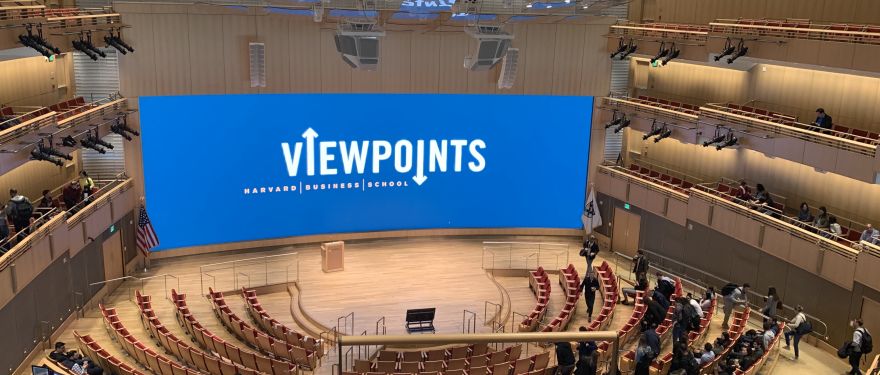Last week, all the first-year (RC) students completed “Viewpoints,” a day designed to expose us to current issues at the intersection of business and society taught by more than 20 HBS faculty members. We explored a variety of topics, ranging from reimagining capitalism, to diversity and inclusion, to the future of work, to peace and reconciliation.
After a discussion-filled day, Professor Rivkin concluded the event by asking us: “Given the current issues we are facing, what are the skills/qualities we should have?” He gave us his two answers. The first was the ability to unlock the potential of differences, and the second was the character that deserves trust.
Both answers resonated with me and so my question became: “How can I achieve these two goals?” First, to celebrate differences, I believe we should shift from binary thinking into synthetic thinking. Second, to be trusted by others, I believe we should recognize our limitations, instead of blindingly trusting in ourselves.
1. Shift from binary thinking into synthetic thinking
The keynote presentation painted the state of the world to be governed by binary thinking. The world is increasingly becoming more polarized, whether by nation (us vs. them), by wealth (rich vs. poor), and by political orientation (Right vs. Left). This is a world where there is thesis and anti-thesis; and these two positions are seemingly incompatible.
However, the following sessions I attended suggested that we can reconcile these two ideas by synthesizing them at a higher level. For instance, in the reimagining capitalism session, we explored the idea of “shared value”, which is a state where a business achieves both profitability AND social value. The process of synthesis is not a mere identification of the overlapping area of two circles in a Venn diagram, as these two circles often do not overlap. It will require another axis. In other words, it is not just A or B, nor A and B, but coming up with a solution C that constitutes A and B.
2. Think hard, but stay humble
We had the honor of having two renowned journalists, Bethany McLean and John Carreyrou, join us to discuss the topic of building and maintaining trust in businesses. My takeaway from this session was that, while trust is valuable, the extreme level of trust is not; Enron and Theranos cases happened partly due to the over-trust, whether to the establishment or to the Silicon Valley dream.
To maintain the right balance of trust, I believe what is important is to have a healthy skepticism in ourselves and proactively put a structure to complement our limitations. For instance, in the “leaders lightening the fire with words” session, we learned how Martin Luther King Jr. was not necessarily born as a charismatic public speaker, but he developed the skills through deliberate practice. In other words, instead of blindly believing in his ability, he identified his development needs and put a structure in place to address them. Similarly, in businesses, we should not rely on our ability, or to the check-and-balance system, but personally create a certain structure to compensate for our limitations, such as by having a person who can candidly express criticism to us.
So, what can we do in our day-to-day life to keep the learnings from Viewpoints alive?
I wonder if we could start asking different kinds of questions both in and outside of the classroom and approach them with a different mindset. In class, we tend to encourage binary thinking (i.e., take a position on whether we agree or disagree with an issue, and look for the evidence to support our side and argue against the other.) Taking a position and conveying a persuasive argument is a very important skill, but once we flesh out both sides of the arguments, I wonder if we could spend more time thinking about how we might be able to synthesize two opposing ideas, as there are truths in both.
Also, instead of approaching the case with a mindset of “I am right and let me prove it to you,” I wonder if we could have a mindset of “This is my belief and I am excited to hear yours to elevate our discussions.” While the issues we discussed in Viewpoints are big and complex problems, I think we can start taking small steps towards change.

